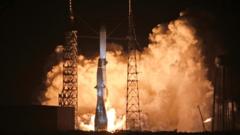Blue Origin has made significant strides with the successful launch of its New Glenn rocket, positioning itself to directly challenge SpaceX's dominance in the commercial space race. Despite losing the rocket's main engine during the mission, this achievement marks a pivotal moment for Bezos's company in expanding space infrastructure.
Blue Origin's New Glenn Rocket Launches: A New Challenger in the Space Race

Blue Origin's New Glenn Rocket Launches: A New Challenger in the Space Race
Jeff Bezos's Blue Origin successfully launches its New Glenn rocket, signaling a fresh competitive landscape in commercial space exploration against SpaceX.
Blue Origin, the space venture founded by Amazon's Jeff Bezos, has launched its New Glenn rocket into orbit, presenting a formidable challenge to Elon Musk's SpaceX. The rocket lifted off from Cape Canaveral Space Force Station in Florida at 02:02 local time (07:02 GMT), marking a crucial step in what promises to be a fierce competition between the two billionaires in the commercial aerospace sector.
In a show of sportsmanship, Musk congratulated Bezos via a post on X, stating, "Congratulations on reaching orbit on the first attempt!" This friendly rivalry is emblematic of the broader ambitions both leaders share: deploying more satellites, establishing private space stations, and facilitating human travel to the Moon.
Dave Limp, CEO of Blue Origin, expressed pride in the successful launch, emphasizing the lessons learned despite facing challenges leading up to the event, including delays due to ice formation on the launch vehicle. Spectators at Cape Canaveral celebrated the launch of the 98-meter-tall rocket, although the company faced a setback as it failed to land the booster on a platform in the Atlantic Ocean for reuse.
The New Glenn rocket, designed to be more powerful than SpaceX's Falcon 9, aims to pave the way for Bezos's Project Kuiper, which seeks to deploy thousands of low-earth satellites to offer broadband services. This directly competes with Musk’s widely adopted Starlink service.
Having operated New Shepard, a smaller reusable rocket, for several years, Blue Origin has struggled to keep pace with SpaceX's rapid launch cadence. SpaceX's 134 launches last year and the anticipated seventh test flight of its mammoth Starship rocket—which dwarfs New Glenn—underscore the fierce competition in the space industry. Dr. Simeon Barber from the Open University notes that successful launches from both companies can enhance competition and drive down operational costs.
With NASA now increasingly favoring partnerships with private firms through lucrative contracts, the stakes in the commercial space race have never been higher. The evolving dynamics between SpaceX and Blue Origin could reshape the future of space exploration and commercial ventures beyond our planet.


















